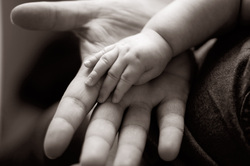The audiobook, New Family Values, by psychologist and writer Andrew Solomon has really helped me to continue to rethink my notions of family. The book has many useful narratives and ideas about different forms of family - same sex parents, single parents, surrogacy, adoption, foster care, multi-parent families, polyamorous families, childless families and child-free families to name a few - and how the law and societal views may lag behind in accommodating this diversity.
|
A large focus of my practice is helping individuals, couples and families understand what works best for them and how to navigate identities and ways of being that have not traditionally been understood or accepted. These are often in the form of diverse sexual orientations (lesbian, gay, bisexual, pansexual, asexual), less conventional relationship orientations (polyamory and consensual non-monogamies) and varied gender identities (transgender, non-binary). However, family structures that differ from "two (first-time) married, heterosexual parents" are often a lot more common than we may assume and hence many of us are currently finding our way in "non-traditional" families or being challenged to re-conceptualise what we consider to be family.
The audiobook, New Family Values, by psychologist and writer Andrew Solomon has really helped me to continue to rethink my notions of family. The book has many useful narratives and ideas about different forms of family - same sex parents, single parents, surrogacy, adoption, foster care, multi-parent families, polyamorous families, childless families and child-free families to name a few - and how the law and societal views may lag behind in accommodating this diversity.
0 Comments
 Babies have a rich mental life, and just like children and adults they can also experience psychological difficulties. Infants may not be able to convey their distress through language but often express their difficulties through restlessness, aggression, sleep, eating, elimination, relationship and developmental problems. Babies' foundational way of knowing and experiencing the world is through their primary caregiver/s. The bond between the infant and their primary caregiver/s (commonly referred to as attachment) plays a huge role in an infant's mental and physical health. This bond can be disrupted for various reasons: due to difficulties within the infant (such as medical problems), difficulties within the primary caregiver/s (for example depression or loss) or in the dynamics between infant and caregiver (for instance a baby with a difficult temperament and a mother with low internal resources due to stressful circumstances). Due to the importance of this bond and the baby not being able to experience psychotherapy by themselves, a strategic intervention for difficulties in infant (and sometimes parental) mental health is parent infant psychotherapy (PIP). In PIP both infant and parent/s are present in the room. The therapist particularly focuses on the relationship between the infant and their caregiver/s to help manage stress and work through psychological tensions in and between the baby and their caregiver/s. The therapist also provides the dyad (or triad) with support and guidance. Columbia University's Center for Psychoanalytic Training and Research describes what parent infant psychotherapy is a different way and provides a useful case example to better understand what PIP may entail. The Standards of Care for the Health of Transsexual, Transgender, and Gender Nonconforming People9/5/2013  The World Professional Association for Transgender Health (formerly the Harry Benjamin International Gender Dysphoria Association) produces the Standards of Care for the Health of Transsexual, Transgender, and Gender Nonconforming People (SOC). The goal of the SOC is to: "provide clinical guidance for health professionals to assist transsexual, transgender, and gender nonconforming people with safe and effective pathways to achieving lasting personal comfort with their gendered selves, in order to maximize their overall health, psychological well-being, and self-fulfillment. This assistance may include primary care, gynecologic and urologic care, reproductive options, voice and communication therapy, mental health services (e.g., assessment, counseling, psychotherapy), and hormonal and surgical treatments." The Standards of Care are not only an important document for health professionals but also for trans people and their significant others, friends, families and allies (SOFFAs). The SOC can be used by trans and gender nonconforming people as a guide for their transitioning and by SOFFAs to understand the transitioning process and how they may aid in maximising the health and well-being of trans and gender nonconforming people. The Standards of Care were originally drafted in 1979 but have been revised and reworked numerous times. The latest SOC is in its 7th version and were released in 2011. The SOC can be downloaded from the following link: http://www.wpath.org/documents/Standards%20of%20Care%20V7%20-%202011%20WPATH.pdf  Biologists and evolutionary psychologists have frequently proposed that the male strategy to get as much of one's genetic material into next the generation as possible has centred on men maximising their number of mates and minimizing their parental investment in their young. In relation to this strategy, proposed female strategies have often centred on women securing mates that will provide them with resources to raise their young. Traditional gender roles have often complied to this view of parenting in which mothers are primarily in charge of bringing up their children ("barefoot, pregnant and in the kitchen") while fathers are responsible for providing an income for their family. Gender roles, however, are constantly in flux and fathers' involvement in the parenting of their children is on the rise. The following BBC documentary introduces some interesting research on the biological reactions fathers have to being a parent and the unique qualities that fathers bring to parenting. Some of these findings include:
These findings have interesting implications on how fatherhood is constructed and in understanding the important roles that fathers may play in their children's development (especially their early development).  Psychologists have often neglected the importance of siblings - or not having siblings in the case of the only child - in an individual's development. Psychoanalytic theorists (Freud and his followers) especially have frequently rather focused on the relationship and dynamics between the child and its parents. However, some contemporary research and theory emphasises the significance of also thinking about and understanding the impact our siblings have on our personality development and the decisions we make in our lives. In the following video Jeff Kluger gives an interesting talk on "hidden power of siblings": |
Jonathan's BlogI use this blog to post links to articles and videos that may relate to some of my services or interests. This content may also be useful for potential clients as well as other people interested in psychology and self development. Archives
July 2021
Categories
All
|



 RSS Feed
RSS Feed